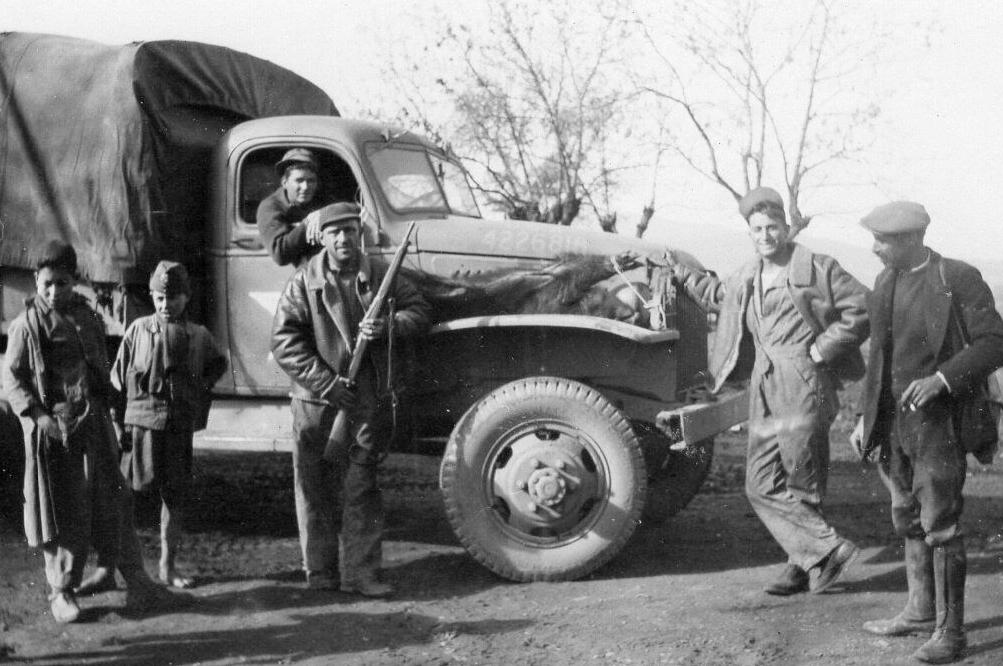
Operation Torch: The Americans

Figure 1.--The Americans were not involved in the initial fight for Tunisia. They had landed in Morroco and eastern Algeria. Only the British landing in eastern Algeria were in a position to make the rush to the Tunisian ports (Bizerte and Tunis). The Americans would move east by truck over unimproved roads, but this would take time. Time to secure the Vichy colonies and time to lamd the trucks needed. The winter rains also slow the process. Here we see the GI truckers, Arab children and a French farmer, along with diiner. The caption on the back read, "Roy Thrasher Detroit, Michigan; in cab Junior, Conley; French civilan; 2 Arab kids; wild bore on fender of truck" The photograph is not dates, but was probably taken arounf Janyary 1943 somewhere in Algeria.
|
|
The Royal Air Force had stopped the Germans at the Channel (1940). And an American blank check (Lend Lease) meant that the Germans could not defeat the British. But with the French defeated and the NAZIs occupying most of Europe, Britain did not not have the capability returning to the continent and liberating even Western Europe. For that the Americans were needed. Only the Americans had the possibility to mobilize and equip an army that could return to the continent. The first real test of the Americans in the Pacific came in Guadalcanal (August 1942). In the West it was Torch. The effort to seize Tunisia as part of Torch was mostly a British effort as the American forces landed im Morocco and western Algeria. It was the British First Army landing at Boucie (eastern Algeria) that was close to the Tunisian border. As a result, for the most part American forces were not available. And Hitler's decision to rush German forces into Tunisia stopped the Allied drive. It would take some time to move the American forces east. Casablanca to the German Tunisia was sometning like 1,000 miles and this had to be done by truck oer very basic roads during the winter rains whivh turned the dirt roads into quaqmires. Shipping shotages affected the campaign. Not only were the number of transports limited, but the German U-boats were repoting successes in the North Atlantic. They missed the Torch convoys, but were sinking substantial numbes of merchant vessels. The shipping shortages meant that trade offs had to be made. And the Americans decided on men over equipment. Meaning tha there was a erious shortage of trucks--the only way Americans had to move east to joi the ight in Tunisia. And there were not only the logistical problems. The Vichy forces had to be dealt with. While open resistamce ended after the firt few days, they refused to join the Free French meaning the Americans could not move full force east. The invasion was done on a shoestring with limited preparation. The American forces were green and not fully trained. The officers yet untested. And they were not yet well equipped. The limited supply of M4 Shermans tanks had been shipped to Mongomery's Eighth Army in Egypt. The Americans had to land with obsolete M2-Stuarts and M-3 Grants. The Americans thus experienced problems in the initial contact with the Germans, most vividly seen with the disater at Kaserine. Fortunately for the Americans, this occurred in a theater in which the Germans did not have the capability to exploit their inital success. Three results flowed from this. First, the commanders who would lead the army emerged, including Eisenhower, Patton, Bradely, and Clark. Commanders who could not perform were relieved. Second, the Americans Army was blooded and learned from the experience. The men now knew what to expected from a determined and well-armed ememy. Commanders also adjusted tactics as well as training protocals. Third, another eult from Kaserine was less forunate. The British began to think that American soldiers were inferior. They began to refer to the Americans as 'our Italians'. This is how both Field Marhall Alexander (commander of Allied forces in North Africa) and Montgomery thought. Alexander did not say so openly, Montgomery did. Which is a little strange given the fact that it had taken the British 3 years to lean how to fight the Germans. The Americans would prove must quicker learners. Alexander would change his opinion. Montgomery never did. [Weinberg, pp. 443-44] While the British and Americans were learning how to fight the Germans, it should be noted that the Allied victories in North Africa and elsewhere were basically due to Allied superiority in men and supplies along with naval and air dominance. Fortunately for western civiliation, no country on earth could outproduce the Americans.
CIH -- WW II

Navigate the CIH World War II Section:
[Return to Main Operation Torch page]
[Return to Main Alamein/Torch page]
[Return to Main World War II campaign page]
[Biographies]
[Campaigns]
[Children]
[Countries]
[Deciding factors]
[Diplomacy]
[Geo-political crisis]
[Economics]
[Home front]
[Intelligence]
[Resistance]
[Race]
[Refugees]
[Technology]
[Bibliographies]
[Contributions]
[FAQs]
[Images]
[Links]
[Registration]
[Tools]
[Return to the Main World War II page]
Created: 4:01 AM 5/19/2019
Last updated: 4:01 AM 5/19/2019



